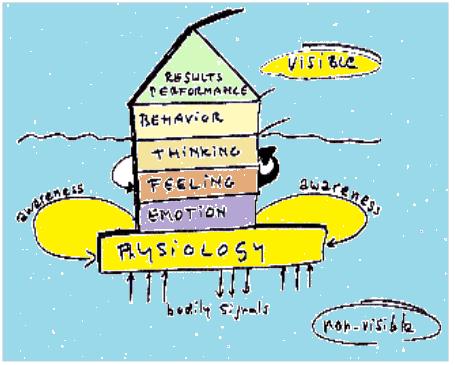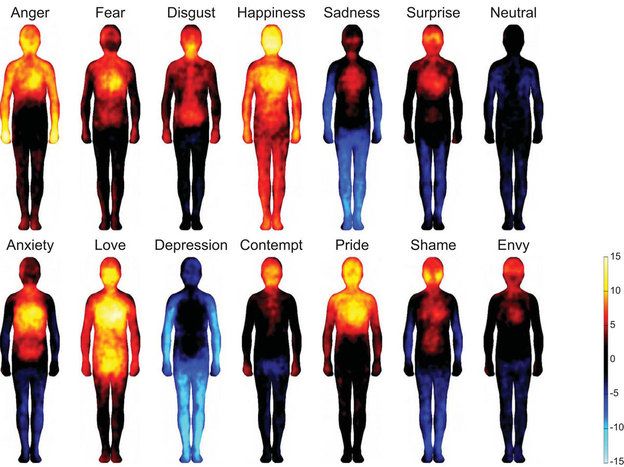
Adapted from Coherence, Dr. Alan Watkins
You are motivated and hardworking but sometimes in some situations, something is off, or you feel off. It’s not that you don’t know what to do, you do know what to do, but somehow, you’re just not able to pull yourself together to do what you need to do, to do what you know will get you to your desired outcome.
Typically, when you have a goal you select a behavior that you need to deploy in order to achieve your goal. If you don’t do anything not much will happen, right? So, you evaluate, assess, think through what’s in front of you and then figure the behavior that you believe will get you there. So, the sequence goes like this:
Thinking ⇒ Behavior ⇒ Goal/Result
There’s only one problem with this perspective, it is a partial view of how you function, and the fallacy is that this approach ignores some fundamental parts.
The missing part is in what underlies your thinking, what influences it, and it is your feelings. How you feel determines how you think. Remember when you decided to start exercising four times a week or stop micromanaging or quit smoking? How long did you stick to it? Not very long…This is why New Year’s resolutions don’t work. You decide to start a new behavior and you stick to it initially but then after a while you drop it and return to your old ways.
What is happening here? Have you changed your mind? No. But still for some reason you can’t seem to be able to continue. The problem here is that your feelings are not aligned with your thinking. You still believe that you should be changing your behavior but unfortunately, somewhere in yourself, how you feel about it, does not agree with how you think and undermines your motivation. Of course, you can force yourself to stick to it for a short while, but it is not sustainable. Relying on your strength of will is not sufficient for your behavior to last, and your feelings need to support your thinking to make it work in the long run.
Feelings and Reason Work Together
You’re not a robot, you’re driven by emotions and feelings. It doesn’t matter how smart you are or how hard you work, if your feelings are not aligned with your reason you’re making it very hard on yourself and setting yourself up for failure.
Emotional self-awareness is a building block of Emotional Intelligence and for a good reason. Unless you’re aware of your own emotions, understand why you feel the way you feel and are able to manage it, you won’t be able to understand how others feel nor manage your social interactions.
Feelings contain important messages about what matters for you, what is safe or threatening, and it is essential to integrate this information in your thinking processes to make good decisions.
What’s the difference between emotions and feelings? Most people use these terms quite interchangeably, but neuroscientists explain that feelings happen in the mind while emotions happen in the body. Feelings are a mental representations of the sensations and bodily changes that you experience as a result of having emotions. When you have feelings you’re aware of them, you say “I’m angry” or “I’m happy”. Emotions on the other hand are physiological changes such as accelerated heartbeat or breathing, change of facial expressions, release of neurotransmitters in the brain such as cortisol or adrenaline. They occur in response to perceived stimuli coming from your environment, the situations you’re encountering, and you may not be aware of them when they happen.
Dr. Antonio Damasio is a prominent neuroscientist who has spent his entire career studying the impact of emotions on the brain. He developed the theory of Somatic Markers, which shows that you need emotions to make good decisions. The bodily changes related to emotions are called “somatic markers” which over time become associated with particular situations, memories and their outcomes. For example, an accelerated heartbeat and shallow breathing are associated with anxiety or anger, nausea is associated with disgust, while a feeling of lightness and energy in the entire body is associated with happiness.
Our Physiology Matters More Than You Think
So how can you align your feelings with your thinking? Feelings seem so hard to manage, so overwhelming at times. The reason is because your feelings are determined by your emotions, which happen in your entire body, and are connected to biological processes that are programmed in your body and happen automatically, mostly below your awareness, in your subconscious, as a reaction to your perceptions of your circumstances. Pretty hard to control something that happens under the radar and automatically!
In the end what determines your emotions is your physiology. If you’re in the grip of anxiety for example, with an accelerated heartbeat, shallow breathing and stress hormones flooding your brain it’s going to pretty strongly impact how you feel, how you think and how you behave.

Research in the fields of psychophysiology and neurocardiology, studies the relationship between body and nervous system. It has shown that the human heart is much more than just an efficient pump that sustains life and that the heart’s rhythms are actually the best indicators of your emotional states. The HeartMath Institute(MHI) Research Center studies the physiological mechanisms by which the heart and brain communicate and how the activity of the heart influences our perceptions, emotions, intuition and health.
This research shows that “heart rate variability” or heart rhythms are the best indicators of one’s emotional states, current stress and cognitive processes. HMI says, “stressful or depleting emotions such as frustration and overwhelm lead to increased disorder in the higher-level brain centers and autonomic nervous system and are reflected in the heart rhythms and adversely affects the functioning of virtually all bodily systems”.
In a state of “Coherence”, all physiological rhythms are in sync and harmonious, while in stress they becomes chaotic and emotional and mental functioning deteriorate. This also explains why people experience the feeling or sensation of love and other regenerative emotions as well as heartache in the physical area of the heart.
HMI says:
“numerous studies have shown that heart coherence is an optimal physiological state associated with increased cognitive function, self-regulatory capacity, emotional stability and resilience. ”
Dr. Alan Watkins, a British performance and leadership expert with a background in neuroscience and medicine highlights the powerful impact of physiology on performance in his book Coherence . In this Ted talk he gives a live demonstration using a heart monitor on a volunteer from the audience, showing how stress shows up in the heartbeat and deteriorates brain functioning, becoming equivalent to “a DIY lobotomy”.
So, in order to change your emotional state, so that your feelings re aligned with your thinking and generate the behavior that you want to achieve your goals, you need to change your physiology first. Continuing with the previous example, you’ll need to get out of your anxious state and move to a more positive and motivated emotional state to be able to consistently deploy a behavior that is supportive of your goals. How do you do that?
Emotional Regulation Determines Your Performance and Your Well-Being
Best practices based on research and studies recommend calm, rhythmic breathing and focus on positive emotions.
It has been shown that breathing and positive emotions quickly return your physiology to a state of coherence. Regular practice is critical because repetition rewires the brain and what you want to rewire here is your physiological baseline, which took you years and years to develop. Because of the brain’s neuroplasticity, every feeling, thought, behavior you have changes your brain so the more repetitions the deeper the impact. The Inner Balance app will walk you through the practice and give you valuable feedback.
Modern life keeps you in a constant state of arousal which often means chronic stress. Managing your emotions and being able to regulate them is more important than ever and of particular importance stressful and negative emotions, such as anxiety, fear, anger. When you experience times when you feel emotionally overwhelmed and allow your feelings to control your actions, you often regret the things you say or do and wish you had been able to keep these in check.
Being able to regulate your feelings allows you “flip the switch” and choose the behaviors that serve you best, rather than being pushed to act by your emotions and end up doing something that may be detrimental.
Emotional regulation and stress management abilities, are a part of your Emotional Intelligence skills and help develop resilience, maintain good health, motivation and energy. Stress is part of life, and is not going away so what matters is not trying to eliminate it but managing it effectively. Doing so improves your ability to process it and recharge and positively impacts your physiology, well-being and brain functioning.
Developing regular practices that support emotional regulation and stress management is part of good self-care and essential in modern day life. Some popular examples include mindfulness, meditation, exercise, adequate amount of sleep. Here are some other suggestions that you can explore:
- The Inner Balance™– Heartmath Institute Sensor and app for iPhone or Android
Trains you to shift and replace emotional stress with emotional balance and coherence. Incorporates a heart-rate monitor, that measures changes in your heart rhythms.
Inner Balance is based on the Coherence research. Coherence is a state of synchronization between your heart, brain and autonomic nervous system that has been proven to have numerous mental, emotional and physical benefits. You can think of coherence as a simultaneous state of relaxation, readiness and revitalization. Some refer to this as a balanced state of composure or poise. Coherence improves performance, health and emotional well-being.
- Alignment Exercise
Applying the framework discussed in this article, use this exercise to align your thinking, feelings and emotions. Take a piece of paper and consider the following questions. When you have to make a decision or are facing a challenging situation:
- What is your reason telling you?
- What are your feelings telling you?
- What is your body telling you?
- How do you integrate all?
Write down your answers and wait 24h, then repeat the process. You will be able get to a deeper level of understanding, which may bring additional insights and more clarity.
- Take a walk in nature
Take advantage of the beautiful summer weather to spend more time outside. Studies show that hanging out in a park, garden or wooded area has tremendous benefits for your health and causes measurable changes in your physiology such as decreasing stress hormones, blood pressure and heart rate.
Use a break or lunch time to take a 30-minute walk in nature to reap these stress lowering benefits and boost your well-being.
- Book –Transforming Stress: The HeartMath Solution for Relieving Worry, Fatigue and Tension, by Doc Childre and Deborah Rozman, Ph. D
Learn more about the impact of stress, stress management techniques and exercises for your practice and well-being.






























